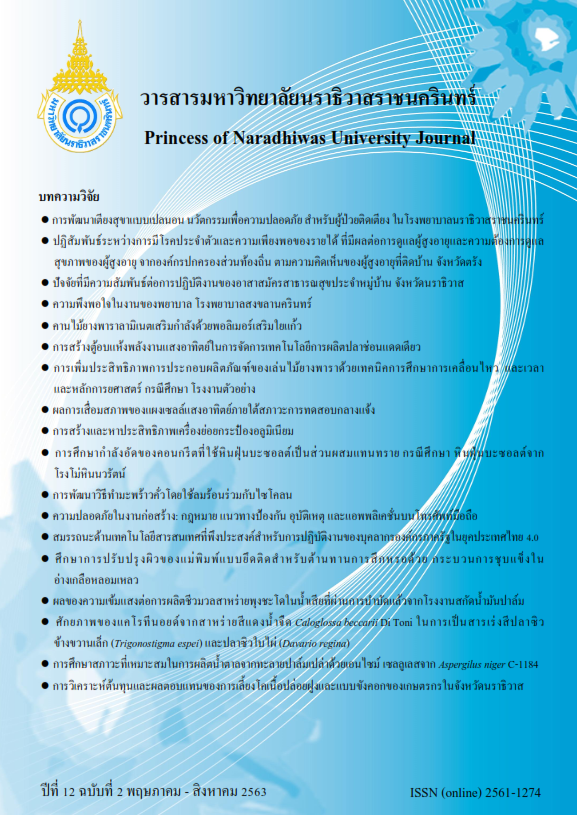Desirable Information Technology Competencies for Government Employees in Thailand 4.0 Era
Keywords:
Performance, ICT competencies, Desirable information technology competenciesAbstract
The objectives of this research were: 1) to synthesize the desirable Information Technology (IT) competency framework of work performance of government employees in Thailand 4.0 era and 2) to study the desirable IT competencies for employees from the perspectives of executives. The questionnaires were used to collect data. The target group was 323 executives working in government organizations. Data were analyzed using basic statistics: means and standard deviation. The results revealed the desirable IT competency framework for government employees in Thailand 4.0 era consisted of 8 components and 40 variables. From the perspectives of executives, the desirable IT competencies consisted of 5 components and 20 variables in which the competency in Technology had the highest mean.
References
Arayapitaya, S. (2015). IT core competencies Maejo University. Retrieved August 8, 2019 from https://erp.mju.ac.th/acticleDetail.aspx?qid=434
Connor, O.B. (2011). A report of the international ICT literacy panel, digital transformation: a framework for ICT literacy U.S.A.: Educational Testing Service (ETS).
McClelland, D. C. (1970). Test for Competency. Rather than intelligence American Psychologists. 17(11), 57-83.
Jampatong, S. (1998). The Study of competencies of computer teacher during 1997-2007. A thesis submitted in partial fulfillment of the requirements for the degree of Master of Science in Industrial Education King Mongkut’s University of Technology Thonburi. (In Thai)
Jarupoom, A. (2016). A study of information technology competency for government readiness on digital economy: case study at information and communication technology centre - office of the permanent secretary, ministry of finance. An independent study submitted in partial fulfillment of the requirements for the degree of master of political science (public administration and public affairs) executive program in public administration and public affairs faculty of political science Thammasat University. (In Thai)
Jong H., K. Jung. S.Y., & Lee. W.G. (2008). Design of contents for ICT literacy in-service training of teachers in Korea. Retrieved August 8, 2019. from http:// www.sciencedirect.com/ science/article/pii/S0360131508000651
Mardthing, S. (2014). Key ICT competency of school administrators in the 21st century. Journal of Education Prince of SongKla University, 25(2), 1-12.
Ontavor, K. (2013). A development of ICT competency indicator model for faculty member in institute of physical education Thailand. A thesis submitted in partial fulfillment of the requirements for the degree of doctor of philosophy in information technology school of information technology Sripatum University. (In Thai)
Paophanao, S. (2012). The study of information technology and communication competencies for learning of undergraduate students in Rajamangala University of Technology. Journal of Nursing and Education, 5(1), 541-561.
Paruang, S. (2011). Development of information and communication technology competency of education students. A Dissertation submitted in partial fulfillment of the requirements for the degree of doctor of philosophy program in higher education department of educational policy, management and leadership faculty of education Chulalongkorn University. (In Thai)
Pleanbangyang, S. (2015). Effectiveness in Using Information Technology for Working of Local Administration Organization Officials Case Study: Amphoe Phutthamonthon. E – Journal of Silpakorn University, 8(3), 1051-1062.
Pooksap, T., Arreerard, T., Jinjo, S., & Phomasakha Na Sakolnakorn, P. (2016). The Synthesis of the Competency Framework of Information and Communication Technology (ICT) for Undergraduate Students Majoring in Sport Science at the Institute of Physical Education. Journal of Industrial Tehnology Ubon Ratchathani Rajabhat University, 6(2), 145-165.
Sangkharom, R. (2017). Information and Communication Technology competency of public relations officers at the Pathumthani Primary Educational Service Area Office. Document Plus Company Limited
Salpeter, Judy. (2011). 21st Century Skills: Will Our Students Be Prepared? Retrieved August 8, 2019. From http://www.techlearning.com/article/13832
Seelapkuea, V. (2012). Essential information and communication technology competencies for university operations: A case study of Prince of Songkla University supporting staff. A thesis submitted in partial fulfillment of the requirements for the degree of Master of Science in Management of information technology Prince of Songkla University. (In Thai)
Srimungkla, S., Wongchachom, J., & Romyen, L. (2018). Competency the use of information and communications technology Infrastructure of teachers under the office of Sakonnakhon Primary Educational service area 3. Sakon nakhon graduate studies journal, 15 (70), 189-197.
Thailand Professional Qualification Institute (Public Organization). (2017). Competency Standard. Retrieved August 8, 2019. from http://tpqi-net.tpqi.go.th/home/Occ/group/industrial




